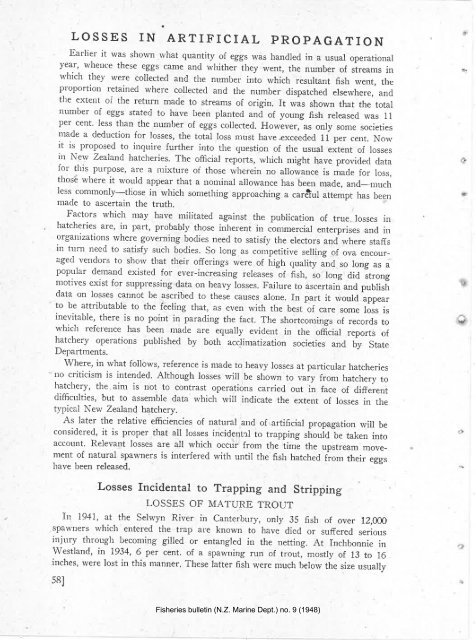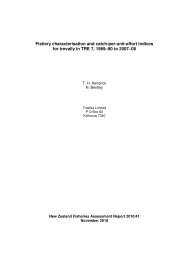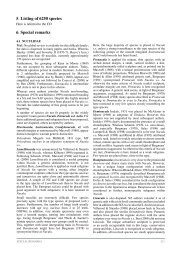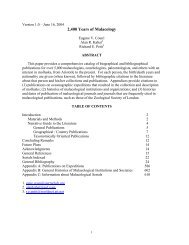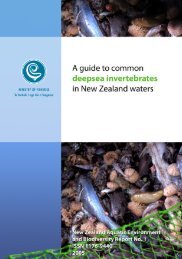N.Z. MARINE DEPARTMENT-FISHERIE,S BULLETIN No. .į
N.Z. MARINE DEPARTMENT-FISHERIE,S BULLETIN No. .į
N.Z. MARINE DEPARTMENT-FISHERIE,S BULLETIN No. .į
You also want an ePaper? Increase the reach of your titles
YUMPU automatically turns print PDFs into web optimized ePapers that Google loves.
LOSSES IN ARTIFICIAL PROPAGATION<br />
Earlier it was shown what quantity of eggs was rrandled in a usual operational<br />
year, whence these eggs came ancl whither they went, the number of streams in<br />
rvhich they were collectecl ancl the number into which resultant fish went, the<br />
¡>r-oportiou retained where collectecl ancl the number clispatched elsewhere, and<br />
the extent o[ the return macle to streams of origin. It was shown that the total<br />
'umber<br />
of eggs stated to have been plantecl anã of young fish releasecl was 11<br />
per cent' less than the number of eggs collectecl. Howãver,-as only some societies<br />
urade a deduction for losses, the total loss rnust have æxceeded 11 per cent. <strong>No</strong>rv<br />
it is proposed to inquire further into the cluestion of the usual extent of losses<br />
in lrlew Zealand hatcheries. The of;ñcial reports, which migl-rt have proviclecl clata<br />
for this Ptlrpose, are a tlixture of those wherein no allowance is macle for loss,<br />
those where it would appear that a nominal allowance has beer-r nrade, ancl-much<br />
less cot¡rnonly-those in which something approaching a carelul attempt has bee'<br />
made to ascertain the truth.<br />
Factors which may have rnilitated against the publication of true losses in<br />
hatcheries are, in part, probably those inherent in commercial enterprises ancl i¡<br />
organizations where governing bodies neecl to satisfy the electors and where staffs<br />
iu turn need to satisfy such boclies. So long as competitive selling of ova encouragecl<br />
ver-rdors to shorv that their offeri'gs were of irigh cluality ancl so long as a<br />
popular demancl existed for ever-increasing releases of nrn, .o long did ltrong<br />
motives exist for suppressing data on heavy losses. Failure to ascertain and publist<br />
clata on losses cannot be ascribecl to these caLlses alone. fn part it would ãppear<br />
to be attributable to the feeling that, as even with the best of care some loss is<br />
inevitable, there is no point in paracling the fact. The shortcomings of records to<br />
which reference has been macle are equally eviclent in the official reports of<br />
hatchery operations publishecl by both acclimatization soçieties and by State<br />
Departments.<br />
Where, in what follows, reference is made to heavy losses at particular l.ratcheries<br />
ilo criticism is intended. Although losses will be shown to vaiy from hatcl-rery to<br />
hatchery, the aim is not to contrast operations carriecl out in face of different<br />
difficulties, but to assemble data which rvill indicate the extent of losses in the<br />
t1'pical Ne"v Zealand hatchery.<br />
As later the relative efficiencies of natural and of artificial propagation will be<br />
considered, it is proper that all losses incidental to trapping should be taken into<br />
accottnt. Relevant losses are all which occur from the time the upstrearn Íìovetnent<br />
of natural sPawners is interfered with until the fish hatched fiom their eggs<br />
have been released.<br />
Losses Incidental to Trapping and Stripping<br />
LOSSES OF MATURE TROUT<br />
In 1941, at the Selwyn River in canterbury, onry 35 fish of over 12,000<br />
spawners which entered the trap are known to have clied or suffe¡ecl serious<br />
injury through becoming gilled or entanglecl in the netting. At Inchbonnie in<br />
westlancl, in 7934, 6 per cent. of a spaw'ing run of trout, mostly of 13 to 16<br />
inches, were lost in this manner, These latter fish were much below tLe size usually<br />
s8l<br />
Fisheries bulletin (N.Z. Marine Dept.) no. 9 (1948)<br />
'..|


